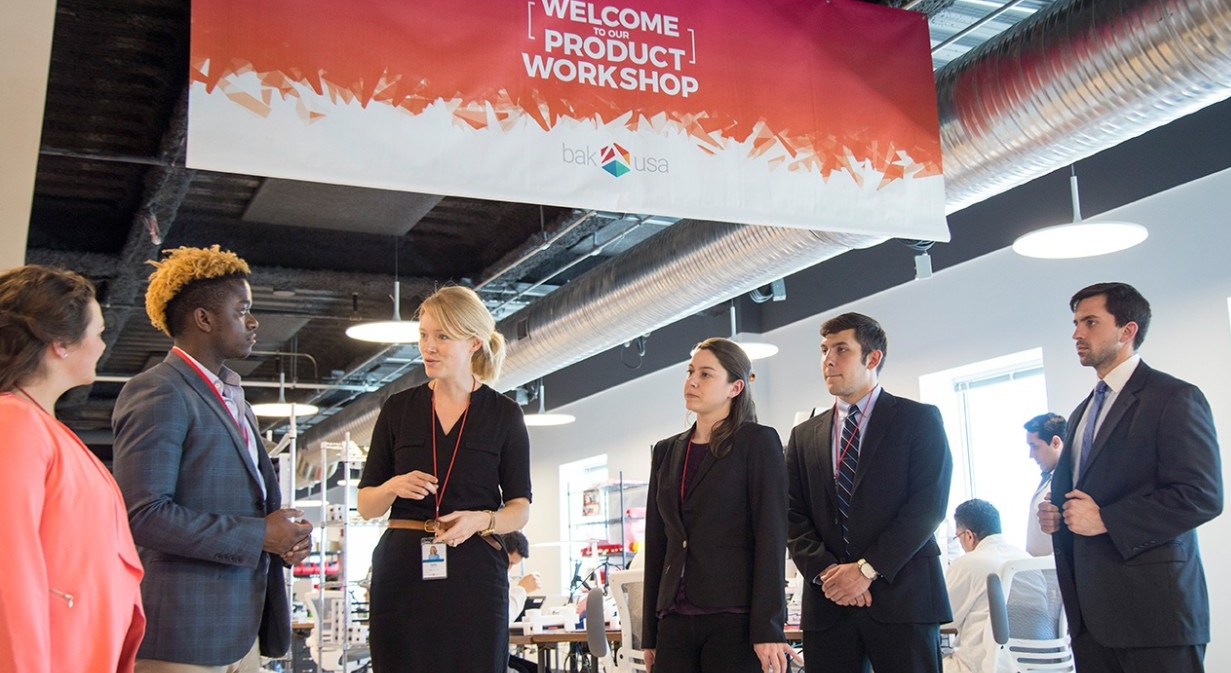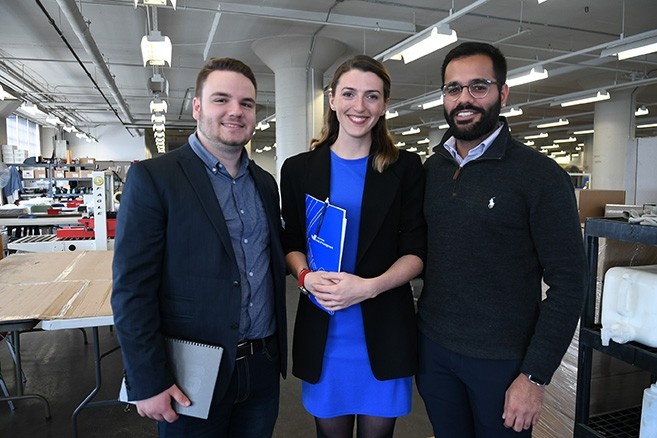MBAs on a mission
By Matthew Biddle
From left, Celine Keefe, MBA ’17; Ikey Ajavon, BS ’15, marketing strategy specialist; Carly Battin, MBA ’09, communications manager; Ellen Ragus, MBA ’18; Mark Wilson, MBA ’18; and Brendan McLaughlin, JD/MBA ’19, in the Bak USA workshop. Photo: Tom Wolf
Four MBA students sit around a conference table with executives from Bak USA, a Buffalo-based social enterprise whose mission is to empower a local workforce to build mobile technologies that are accessible to all.
Representing the School of Management’s MBA Consulting Group, the students have spent the past semester creating a pricing model for a tablet computer that can be customized for future products.
The students present their model and recommendations before fielding questions about cost drivers, add-on packages and other features from Jason Drewniak, vice president of the commercial team, and Carly Battin, MBA ’09, communications manager.
“The students did an excellent job creating an organized way for us to determine the cost of goods sold for each device,” Battin says. “Their model will allow us to be more accurate about what goes into the creation of each product and smarter about what margins and revenue targets we should set.”
Meanwhile, the MBAs received an inside look at the challenges of running a successful mission-driven company and the opportunity to apply their coursework to a real-world business challenge.
“I have a background in market research and gained experience with financial models in class, and wanted to use those skills to help this company,” says Ellen Ragus, a first-year MBA. “At Bak USA, things change minute by minute, so it was valuable to ask people within the organization hard questions to develop our solution.”
The UB MBA Consulting Group is a pro bono, student-run firm that selects three to four projects to complete each semester for small- to medium-sized businesses or nonprofits. They receive guidance from Professors Harold Star and Nick Everest, as well as Tom Ulbrich, assistant dean and executive director of the Center for Entrepreneurial Leadership, and alumni Jennifer Ball, EMBA ’14, CFO of Aspire WNY, and Thomas Palmer, MBA ’71, CEL ’00, member at Bond, Schoeneck & King.
“We choose projects that are ambitious and can help organizations in the community,” says Alexandra McLeod, MBA ’17, who joined Deloitte this fall as a cyberrisk consultant. “Often, projects shift after the initial proposal, giving us valuable experience in understanding and defining the scope of work and pushing through ambiguity to solve a pressing problem.”
From left, Daniel Franasiak, MBA ’18, Alexandra McLeod, MBA ’17, and Adhiraj Singh Rathore, MBA ’17, at Diversified Labor Solutions. Photo: Nancy J. Parisi
McLeod’s team worked with Diversified Labor Solutions, a packaging business operated by the nonprofit Cantalician Center for Learning to provide rewarding, inclusive job opportunities for refugees and individuals with disabilities. During fall 2016, the group developed a five-year strategic marketing plan and, this spring, created additional collateral material, including several one-pagers and a pitch deck leaders can use to spread their mission to state lawmakers, resettlement agencies and other stakeholders.
“Their project is a fantastic accomplishment,” says Anne Spisiak, CEL ’10, executive director. “I could go somewhere tomorrow with a projector and present our story in an organized, visual way.”
Another team worked with Jericho Road Community Health Center, a nonprofit that serves more than 12,000 patients annually, particularly refugees and low-income families. The students were tasked with developing a fee structure for the organization’s clinic in Sierra Leone, but quickly realized most locals could not afford to pay for services. Instead, they researched other potential revenue sources and developed a business plan for a social enterprise that would manufacture and distribute sanitary napkins for women.
Mark Baetzhold, grant writer at Jericho Road, says that while the organization continues to assess various options, the students’ plan appears to be the most feasible to implement.
“The group was able to zero in on a particular opportunity and create a plausible business plan, despite the challenge of gathering accurate information in a developing world market,” he says. “They were professional, responsive and produced a final product that will contribute to the growth of our social enterprise work.”
In addition, the students developed a greater understanding of how nonprofit and for-profit approaches can be used together to address issues of global health and poverty.
“For our clients, it’s not about making money — it’s about improving the lives of the people they serve,” says Brandon Glasgow, a first-year MBA. “As consultants, we have the time and outside perspective to take on these projects, so they can continue to focus on their mission and make a meaningful impact.”

